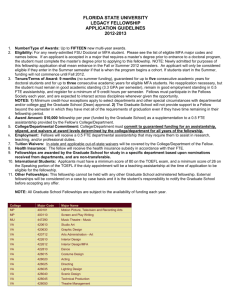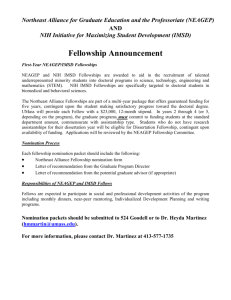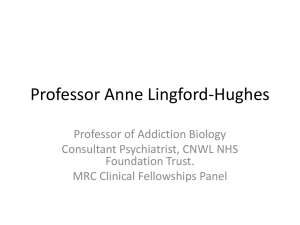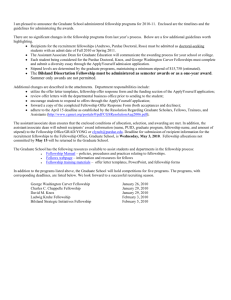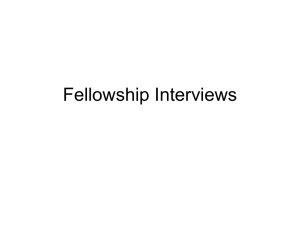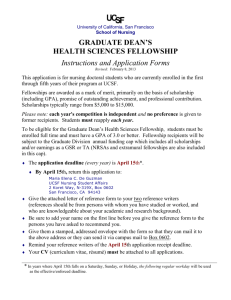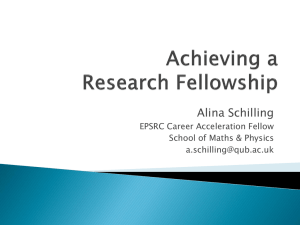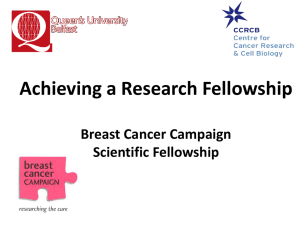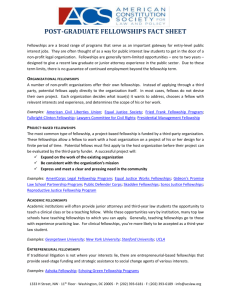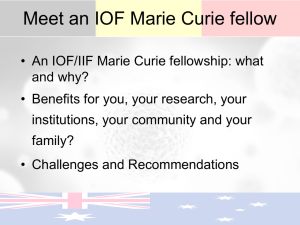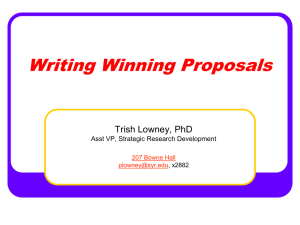Effective Communication for Graduate Funding
advertisement
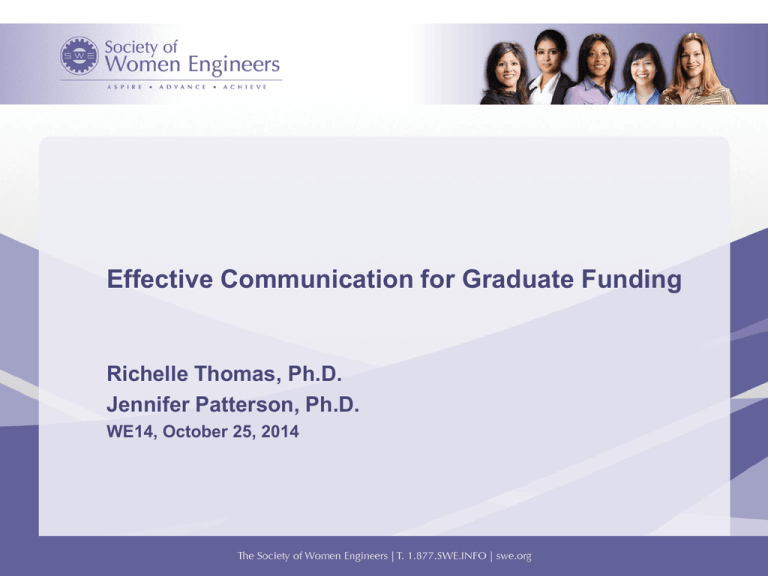
Effective Communication for Graduate Funding Richelle Thomas, Ph.D. Jennifer Patterson, Ph.D. WE14, October 25, 2014 Richelle Thomas, PhD Jennifer Patterson, PhD • Advanced Engineer at Owens Corning Science & Technology • PhD Chemical Engineering • Awards • Assistant Professor at KU Leuven • PhD Boengineering, • Awards US Student Fulbright GEM Fellowship Ernest & Virginia Cockrell Fellowship in Engineering AIChE, BMES Student Travel Fellowships SWE Student Scholarship ACS Award Whitaker International Scholarship (post-doctoral fellowship) National Science Foundation Graduate Fellowship Sigma Xi Grant-in-Aid-of-Research BMES Student Travel Award What skills do you need/learn along your chosen career pathway? The Academic Pathway Bachelor student Master student PhD student Postdoc Professor • • Plus • Writing • Planning • Presenting Plus • Generating ideas • Mentoring others Plus • Asking for funding Plus • Teaching evaluating Information Hands-on experimental skills Industry • Completing assigned tasks, writing reports • Managing a team • Making decisions (based on economics) Why apply for fellowships? In many cases, you may be able to be paid as a research assistant, a teaching assistant, etc. An Honor and a Skill • Useful for building your C.V. or résumé • Helps get additional fellowships for funding • Demonstrates ability to write a proposal Flexibility • May allow you to work for a professor who otherwise couldn’t fund you • Generally have more independence in your research project • May allow you to have other unique experiences, like study abroad Better Pay • Fellowship stipends can often be higher than RA or TA salary • Departments may supplement fellowship awards When to apply for fellowships? Think about it all throughout your education Before starting a graduate program/post-doc • Can help you get a position (particularly for post-doctoral positions) • Gives you flexibility from the beginning • Many fellowships are targeted to “early” studies During a graduate program/post-doc • A fellowship is almost always a good thing to have • If you are further along in your research, you should be able to write a stronger proposal Smaller grants along the way • Often have less involved applications • Can allow you to pursue a side project, get extra research supplies, travel to a conference, etc. How to choose what programs to apply to Be realistic Larger Fellowship Programs • More prestigious • More competitive Smaller Fellowship Programs • May have more defined application criteria • In many cases, may have a better percentage of acceptance Talk to your advisor or academic counselor • How competitive you are as a candidate If you don’t get a fellowship on your first try, keep applying! Setting a timeline to apply for fellowships Find application deadlines • Can be 6 months to a year before fellowship starts • NSF Graduate Fellowship deadline at the beginning of November • NDSEG Fellowship deadline in January Choose what fellowships to apply to • Again, be realistic! • Choose the fellowships that are the best match Start work early • Proposals take time • Ask for letters of recommendation well in advance • Many are now submitted online and can be saved and revised until submitted Key components of a fellowship proposal Curriculum vitae (C.V.) or résumé Statement of previous research/relevant experiences Proposal of research plan/project Non-technical aspects Reference letters Curriculum Vitae (C.V.) or Résumé A C.V. is like an extended résumé • More detail • Not necessarily limited in length Important sections • Education • Thesis titles, advisor names, relevant courses • Awards and Honors (like fellowships!) • Research/Work Experience • Include short description of research findings or skills learned • Teaching/Mentoring Experience (for academic post-doc positions) • Memberships in Professional Organizations (outreach, community involvement) • Publications (name in bold) • Patents • Conference Presentations (note oral presentations) Statement of Previous Research/Relevant Experience Demonstrate you are qualified to conduct the research you propose If you have previous research (lab) experience • During graduate studies or research experience as an undergraduate • Two basic approaches • Abstract for each project • Single statement linking different projects • Organization: focus on most relevant experiences (demonstrate expertise) If you do not have lab experience • Do you have internship or other work experience? • Did you take advanced electives or design courses that provided you with relevant skills? Proposal of Research Plan/Project Grant proposal style • Introduction or problem statement • Hypothesis • Specific aims, objectives, or goals • Description how you would approach those aims or goals (methodology) Essay or statement style • Interest in a specific field but not necessarily a defined problem • Discuss the types of questions that interest you Tips • If you know who you want to work with, get their comments, suggestions, advice • Reference your previous experience but don’t restate it in detail • Include references to the literature if appropriate • Make sure it is well organized and clearly written Tips for Writing Objectives Answer the following questions • What is the problem you are addressing (broadly, specifically)? • How are you addressing that problem? What is the concept/main idea of your project? • What do you consider to be a successful outcome of your project (scientifically, technically)? • What are the main steps you will take in your project? Some words to use • Socio-economical problem • Limitations in the state of the art • Goal • Hypothesis • Objectives Non-Technical Aspects What are “non-technical” aspects of a fellowship application • Personal statements • Long-term goals • Benefits to society • Questions that relate to the goals of the fellowship program Approach • Don’t neglect these aspects • Spend the time to write an appropriate response • Be reflective • Be honest! General Writing Tips Start from an outline • Organization! • Ensures all information is there Writing style • A paragraph should contain a main idea and its supporting information • Usually the first sentence of a paragraph contains the main idea • Consider transitions from one paragraph to the next • Paragraphs should be several sentences long Know Your Subject Define Your Message • Answer the question asked • Organize your material to be clear Organize Your Knowledge • You are telling a story – think about the timing and order of your information • Include a background statement to orient the reader • Clearly state the hypothesis or purpose statement you are discussing • Make a compelling argument • Gather necessary information to support argument Know Your Subject Make your claim! • Find evidence/examples for each • Think about the sequence – refer to your outline • Structure argument from known to new • Use your proven track record of success to substantiate your proposal • Evaluate the skills and qualities you already have Know Your Purpose Subject v Purpose • Subject: concise statement of content • Purpose: what is gained or accomplished • Define the purpose of your proposal Define success • Clearly state the desired outcome of the work • Outline how this project/proposal leads to the desired outcome Know Your Audience Who is the funding agency • What is the organization’s mission? • What target population do they serve? • What are their funding goals? (Why are they giving money?) Reviewers • What is their background? • What questions would they ask – answer them! • Get ALL the reviewers on your side • Write for the generalist and the specialist Know Your Relevance Make the connection - topic • Don’t make the reviewer have to think • Articulate the relevance of the work to the agency’s mission • Highlight the novelty of the project/proposal • Give the significance of your work Make the connection - self • Make yourself the clear choice • Clearly outline why you are the best candidate Know Your Relevance Why should YOU be selected? • What makes you special • Why are you the best fit for this award • Why should they want to fund you • What skills and traits do you have that stand out • Show commitment to the organization’s goals • Show confidence • Present yourself as a sound investment • BE AUTHENTIC Know Your Limits Be clear & concise • Be specific and clear • Avoid being vague • Avoid using jargon, use clear language • If it does not fit, cut it out Get to the point • Avoid being overly verbose • Don’t bore reviewers with mundane details Structure Outline • Keep a single theme throughout your documents • Check outline for chronological order • Insert transitions where appropriate • Use visual or sensory words to captivate the reader • Show commitment to the organization’s goals Reference Letters Don’t wait until the last minute • Ask for reference letters well in advance Who to ask • Professors or supervisors (their title counts!) • People who know you well • People who can comment on your work What to give someone you ask to write a reference letter • The appropriate forms or online instructions and the DEADLINE • At minimum, a copy of your C.V. or résumé • A copy of your proposal or application • Specific items to write about or comment on (remind them of details) • Send a reminder a week or two before the deadline Some Final Tips for Preparing Your Application Don’t wait until the last minute • Can’t say this enough times! Make sure to include everything that was asked for • If sending in a paper application, leave a day or two to print and assemble everything • Tailor statements, essays, proposals to specific application instructions Check spelling and grammar • Have someone proofread your application • Do not exceed page or word limits Richelle Thomas • we15 Graduate Programming Coordinator • richelle.thomas@owenscorning.com Jennifer Patterson • SWE WIA Committee Chair • jennifer.patterson@mtm.kuleuven.be

